US Official Confirms Rocket Attack On Baghdad Embassy
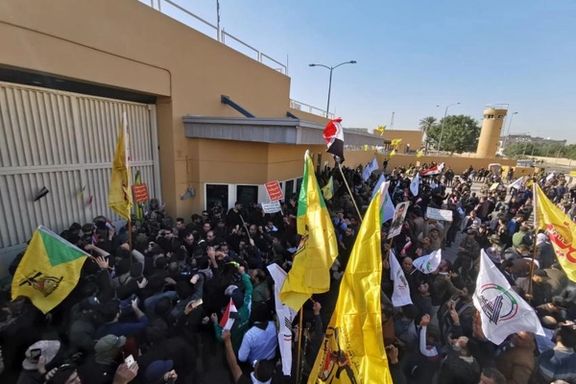
A US military official told Iran International that on Friday, a multi-rocket attack was launched at US forces in the vicinity of Union III and the Baghdad Embassy Complex.

A US military official told Iran International that on Friday, a multi-rocket attack was launched at US forces in the vicinity of Union III and the Baghdad Embassy Complex.
The official also said that no casualties and no damage to infrastructure was reported. Earlier, Al Mayadeen television affiliated with the Iranian government reported attacks on Baghdad's Green Zone, where the US embassy is located.
Explosions were heard near the US embassy in Baghdad's heavily fortified Green Zone early on Friday, according to social media videos verified by Reuters.
Embassy spokespeople did not immediately respond to requests for comment when contacted by Reuters and there has been no official US announcement yet. Social media reports also said sirens calling on people to "duck and cover" were activated.
It was not immediately clear whether the embassy's air defense systems were activated or whether there was damage.
US forces at military bases in Iraq and Syria have faced more than 70 attacks since mid-October claimed by an Iran-backed umbrella organization of Iraqi Shi'ite Muslim armed groups, though diplomatic missions have been spared. The US military has retaliated against militant targets on a few occasions.
Yemen’s Houthis, backed by Tehran, have also launched attacks on commercial shipping and US naval vessels in the Red Sea in the past two weeks. The US this week accused Iran of involvement in assisting the Houthi drone and missile attacks.
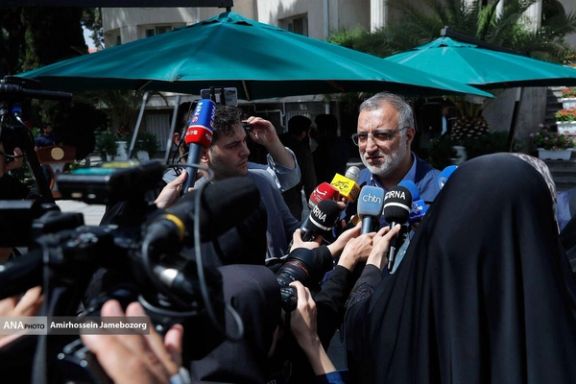
A member of the Tehran City Council made accusations this week that 170 trillion rials, or $336 million of Tehran Municipality's collected revenues are missing.
Habib Kashani, who is also a member of the Tehran City Council's Transparency Committee, told reporters in Tehran that the Municipality’s total revenues were 800 trillion rials last year, out of which some 520 trillion rials have been spent but over 170 trillion rials are missing. This includes urban advertising revenues.
The official called on the Iranian capital's Mayor Alireza Zakani to declare what happened to such a large amount of money, at a time when the Iranian government faces a significant budget deficit. Zakani is a top hardliner, who promotes himself as a committed revolutionary.
The news came as another suspected corruption scandal broke out, with a company allegedly misusing around $3.5 billion of foreign currency obtained from the government.
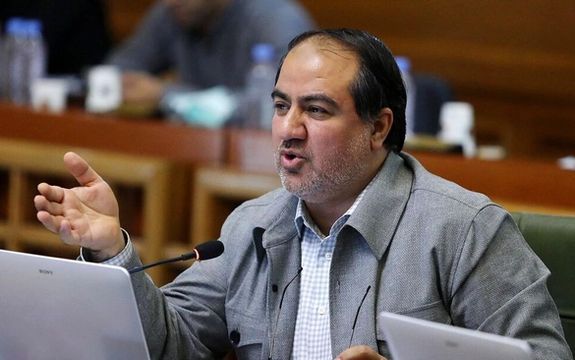
Meanwhile, Ahmad Sadeghi, another city councilor, has said that the itemized list of the municipality’s revenues needs to be verified by experts. In another development, Naser Amani, the councilor in charge of planning and budget expressed appreciation for Zamani’s effort to collect more than 84 percent of the sums due to the municipality during the past year. This means that there are still more revenues to be cashed.
The reports by councilors on the financial situation of the Tehran Municipality are riddled with conflicting and confusing figures that create more questions than they answer.
However, the financial issue was not the only embarrassment for Zakani this week. Social media reports said that the mayor has recently married his second, some say his third, wife. His daughter has been quoted as saying that his first wife has divorced the mayor after she found out that he has recently married the sister of a man who was reportedly killed by protesters in Karaj near Tehran, last year.
Social media users had previously said that Zakani has a wife in Tehran and another one in Qom, as is customary for religious men who spend their time in two different cities. Some users joked that he needed the third wife for the road between Tehran and Qom.
Some social media users on the other hand called for respect for the mayor's privacy, reminding that Islam allows men to marry up to four wives. In the Iranian Shiite sect, men can also get married to more than four women on temporary marriage contracts, taking advantage of a religious formula called "Sigheh".
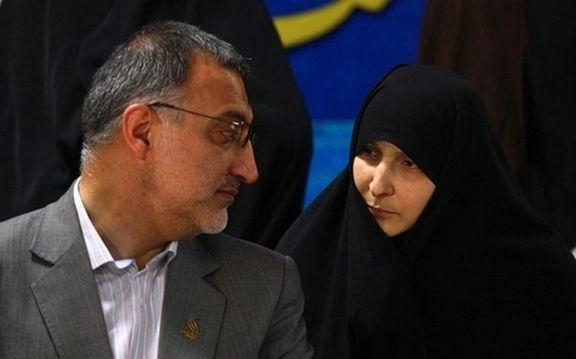
Zakani's first wife, Massoumeh Pakatchi, is in charge of the seminaries for female clerics in Tehran.
Others, including journalist Behnam Gholipour expressed concern that the scandal might affect Zakani's career as a politician and mayor because Supreme Leader Ali Khamenei is against polygamy by officials. He wrote that Khamenei has previously dismissed Basij Commander Alireza Afshar after he found out that the IRGC officer had two wives.
Some sources have said that Iranian reformists are taking revenge on Zakani for Iranian conservatives fanning the rumor mill in Tehran after one of the city's previous mayors, Mohammad Ali Najafi killed his second wife in 2019.
Still other social media users who apparently subscribe to conspiracy theories have said that there must be something bigger going on in Iran and the government is trying to conceal it by a mixture of news and rumors about big financial scandals including the $3.5 billion tea import case and the lost funds at the Tehran Municipality and more attractive reports about Zakani's wives and the arrest of a controversial rapper deported from Turkey.
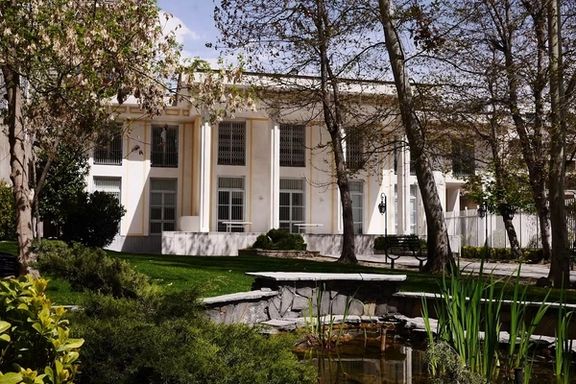
A series of mysterious events have impacted the Swiss embassy in Tehran, including a military attaché seriously injured and an employee's deadly fall from a balcony.
Switzerland's foreign ministry spokesman Pierre-Alain Eltschinger told Iran International on Wednesday that “the Federal Department of Foreign Affairs [FDFA] confirms three accidents or security incidents which occurred in Iran between May 2021 and September 2023.”
Switzerland represents US interests in Iran since Washington and Tehran cut ties shortly after the 1979 Islamic Revolution. The Swiss embassy in Tehran has been consistently relaying diplomatic communications between the Islamic Republic and the United States.
The spokesman added that “based on the facts currently known, the FDFA sees no connection between these incidents,” stating that “The cases are being or have been investigated.”
The most recent "incident” was in September, when a Swiss visa service employee was assaulted in the street on his way to work. He was attacked with a knife and was also shot in the hand. “He was very lucky,” said the diplomat’s entourage. Iran’s foreign ministry confirmed the “incident in which an employee of the Swiss embassy in Tehran suffered an injury to his hand.”
Another unexplained case happened in June, when a Swiss military attaché was found with “moderately serious” injuries in a hotel room in Tehran. According to information from CH Media, the Swiss colonel had significant injuries to his head, both knees as well as his chest and stomach.
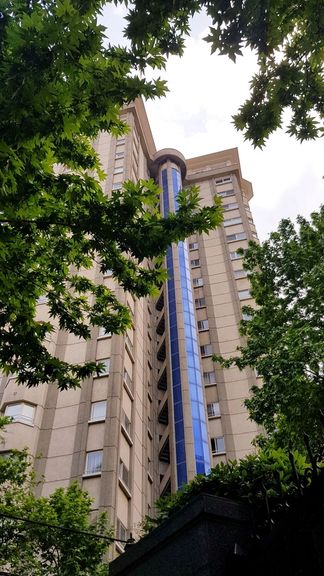
In July, a Swiss army spokeswoman told CH Media, “He had a seizure in his hotel room, fell and suffered a head injury. From June 11 to 15, he was treated in a hospital in Tehran then repatriated to Switzerland on the orders of the doctor at the Swiss embassy. He is fine." At the time of the incident, the unnamed military attaché was stationed in Islamabad but apparently “accredited to Iran” and on a business trip.
The most tragic incident took place on the night of May 4, 2021, when a Swiss diplomat fell from the balcony of her apartment located on the 17th floor of a skyscraper in Kamranieh, a northern district of Tehran. Sylvie Brunner's body was discovered at the foot of the tower block by a gardener eight hours later.
The 52-year-old woman was the first secretary at the Swiss embassy and the head of the department that represents American interests in Iran, leading to curious speculations. Suspicions naturally arise when high-profile people or those engaged in sensitive work fall out of a window, as was the case with Egyptian billionaire spy Ashraf Marwan, who fell out of his London apartment in 2007.
“Suicide is not a possibility,” Tehran's emergency services said at the time of Brunner's death. “Specialized police units are in the process of examining” the circumstances around the death of the “52-year-old Swiss citizen employed by the Swiss embassy in Tehran”, the national police said in a brief online statement.
The Swiss foreign ministry expressed “dismay,” with diplomats saying the affair was “hushed up” internally. "The FDFA confirms that a Swiss employee of the Swiss Embassy in Tehran died in a fatal accident on Tuesday. The FDFA and its head Federal Councilor Ignazio Cassis are shocked by the tragic death and express their deepest condolences to the family," read a statement.
Eltschinger also told Iran International that “all Swiss representations abroad have a security concept in place to protect the infrastructure and embassy staff, which is reviewed continuously and adapted as necessary.” “If a security incident nevertheless occurs, the FDFA will initiate the clarifications necessary and, if required, take additional security measures. All employees are also regularly trained and sensitized with regard to security,” he added.
In 2016, US and Canadian embassy staff in the Cuban capital Havana started reporting a cluster of idiopathic symptoms that came to be known as “the Havana syndrome.” A US academic study found brain abnormalities in US diplomats who worked in Cuba, amid accusations that Cuba carried out "sonic attacks." Starting in 2017, an increasing number of individuals, including US intelligence and military personnel along with their families, began reporting similar symptoms in other locations, including China, India, Europe, and Washington DC.
In January 2022, the CIA issued an assessment concluding that the syndrome is not the result of "a sustained global campaign by a hostile power.” Whether the Swiss intelligence community will release a similar statement, clearing Iran as a hospitable host country for its diplomatic mission, remains to be seen.
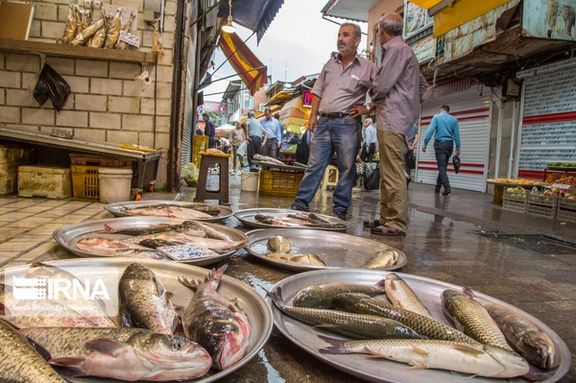
Iranian authorities have blocked the Instagram page of an old man whose singing and dancing videos in public had gone viral over the past days.
The page has been blocked over its “production of criminal content,” Iran’s judiciary said on Thursday. According to reports, all the posts in his Instagram page, with 128,000 followers, were removed.
Iran’s cyber-police has published a new post on his page, warning that it monitors “the criminal activities of the users.” Iran’s clerical regime has become more strict in enforcing their religious laws that do not allow public dancing and singing.
A human rights group identified the old man as Sadegh Bana Motajadded, adding that he formerly served as a fan leader for Sepidrood, a famous football club in the northern city of Rasht, Gilan province.
He found fame a few days ago after some of his videos in Rasht’s fish market went viral. The videos showed him singing and dancing while male and female onlookers joined him by clapping and dancing.
The videos were well received by Instagram users in Iran who thanked the old man for his attempt to make people happy.
On Tuesday, Hossein Hassanpour, deputy chief of Gilan province police, had announced that 12 people were arrested and charged in relation to the release of these videos.
They are accused of “breaking the norms and publicizing it on social and satellite networks,” he said, adding that their recording and publishing the videos of people singing and dancing is an “outrage against public decency.”
Instagram and Twitter users in Iran have strongly condemned the arrests, saying the Islamic Republic is essentially against happiness and hope.
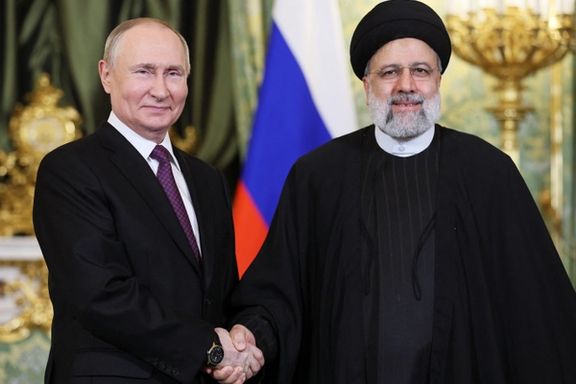
Iran’s President Ebrahim Raisi met his Russian counterpart Vladimir Putin in Moscow on Thursday to discuss the war in Gaza and bilateral relations, IRNA reported.
During the meeting, Raisi once again accused Israel of carrying out “war crimes and genocide” in Gaza, adding that the United States and other Western countries support Israel’s military campaign.
He criticized what he called “the unilateralism and unfairness of the global system,” saying they are now best reflected in the Gaza crisis.
The repeated allegations of Tehran officials against Israel come against the backdrop of Iran’s openly admitted assistance to Palestinian militant groups, Hamas and Islamic Jihad, and its other proxies in the region, such as Hezbollah and Yemeni Houthis.
Their meeting came a day after the Russian president visited the United Arab Emirates and Saudi Arabia to hold talks over the global oil market and the Israel-Hamas conflict.
Raisi praised Tehran-Moscow cooperation in the fields of energy and agriculture, further urging the expansion of ties between the two countries.
Putin told his Iranian counterpart that the volume of Tehran-Moscow trade has reached 5 billion dollars, adding that Russia is ready to expand its ties with Iran in different fields, especially in the field of energy.
In 2022, Iran proudly announced the signing of the “largest oil and gas agreements in the country's history worth $40 billion.” However, Russia has not converted any of these memoranda of understanding (MoUs) into contracts.
About a decade ago, Iran also signed dozens of oil and gas MoUs with various Russian companies, none of which were executed.
Speaking about Raisi-Putin meeting, US National Security spokesman John Kirby said on Wednesday that “it’s certainly not implausible” that Moscow and Tehran would improve their military relations.
Since mid-2022, Iran has reportedly supplied hundreds of kamikaze Unmanned Aerial Vehicles (UAVs) to Russia, which have been extensively used to target civilian infrastructure and cities.

The Iranian Writers’ Association says combatting censorship, a significant tool of suppression, is crucial to safeguarding freedom of speech against government tyranny.
The statement, issued on the Day Against Censorship on December 4 by the long-banned Iranian Writers’ Association (IWA) on Facebook, asserts that censorship has been a decisive instrument over the past four decades to suppress writers, intellectuals, artists, filmmakers, and hinder disapproved social movements and cultural developments.
The IWA's condemnation of censorship extends beyond books and written media to encompass other forms like satellite TV and the internet, enabling the regime to manipulate and mislead society, dismantle independent media, and obscure real information about its oppression, failures, and corruption.
The Iranian regime strictly controls internet access, frequently imposing blackouts during sensitive times, such as widespread protests, and has long restricted access to satellite TV through extensive jamming. The Internet censorship, which began in 2002 by blocking hundreds of websites, later extended to blocking social media platforms. Ten of million of Iranian resort to using VPNs to connect to messaging apps and blocked websites.

Toronto-based journalist and political analyst Jamshid Barzegar told Iran International that the statement, like the statement known as 134 Writers’ Declaration they issued in 1994, can be considered as one of IWA’s “historical statements”.
The 1994 statement marked the revival of IWA's activities after a decade of suppression, condemning the extensive censorship imposed by the regime, demanding freedom of speech for all. Barzgar noted that the recent statement correctly identifies the violation of the right to freedom of speech as a major tool of suppression.
“They have rightly pinpointed the main flaw, the violation of the right to freedom of speech, as one of the major reasons for continuation of the cycle of tyranny [in the Islamic Republic],” Barzgar said.
Members of the association (Kanoon-e Nevisandegan-e Iran in Persian), which was banned two years after the Islamic Revolution of 1979, have been subjected to systematic harassment and persecution for decades.
The IWA named December 4 as Day Against Censorship thirteen years ago in honor of two of its members, Mohammad and Mokhtari Jafar, who were murdered by intelligence ministry agents in 1998 as part of a systematic plan to eliminate intellectuals, political figures, and dissidents.
Tens of dissident politicians, writers, activists, and even academics fell victim from 1988 to 1998 to these systematic murders that were meant to intimidate others into submission by the rulers of the Islamic Republic. The killings came to be known as Iran’s Chain Murders.
Iranian media, politicians and activists have extensively pointed out the similarity between the double murders of filmmaker Dariush Mehrjui and his wife in October this year and the Chain Murders of the 1990s, warning that similar elimination campaigns may have begun again.
In 2021, the American PEN Association awarded Baktash Abtin, Reza Khandan Mahabadi, and Keyvan Bajan with the Pen Freedom Award. According to PEN America’s 2021 Freedom to Write Index, Iran jailed the fourth-highest number of writers and public intellectuals in the world that year. Since then, arrests of writers and other artists have dramatically spiked.